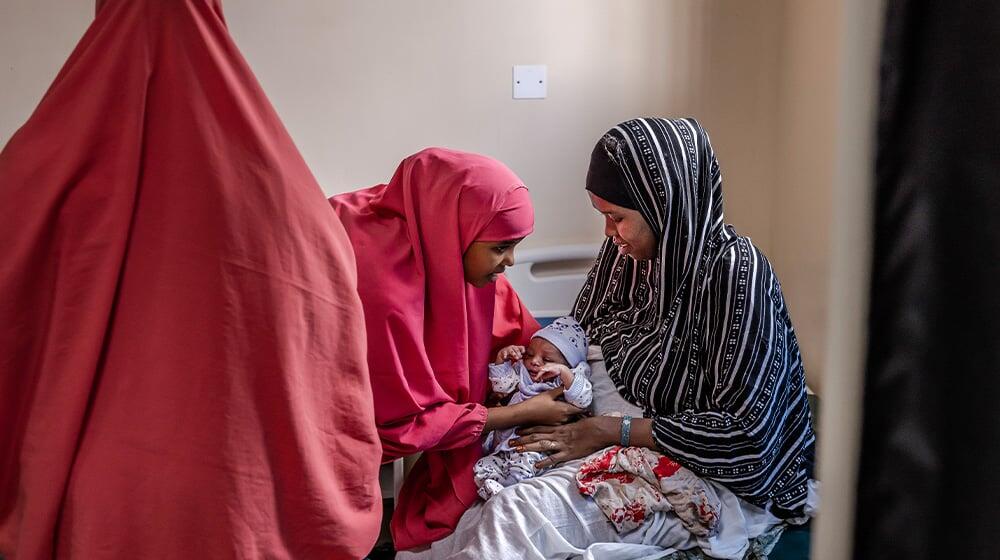By Dr. Mary Otieno
The scale and frequency of climate-related crises in Somalia in the last few years have resulted in unmitigated hardship for communities. Apart from inducing displacement, the lives and livelihoods of families have been upended by drought, floods, and related disasters. Pregnant women and lactating mothers tend to face the harshest brunt of these terrible and unannounced climate crises as their attempts to seek safety often take them away from easy accessibility to care. Against this background, midwives play a crucial role in making healthcare more mobile and ensuring timely support for women, easing access to reproductive health services and safe childbirth during periods of climate-related crises.
Climate change affects health directly due to extreme weather events and air pollution, and indirectly due to food and water insecurity, intensifying the spread of disease, health inequality, and triggering community displacement. While the link between midwives and climate change is often understated, they remain central to mother and child health needs in adverse environmental conditions. These frontline workers already know how to assist during floods, fires, and earthquakes. They are aware of the importance of their profession in raising awareness on an individual and societal level, in addressing the effects of climate change on human health, and in reducing the negative effects of climate change on health. Furthermore, midwives are conscious of the evolving health needs induced by climate change and want to take action in their communities and at the national level with the support of their Associations for the Sustainability of Health.
As our field data suggests, Somali midwives have proven to make a difference in periods of drought or higher temperatures, which tends to exacerbate maternal health issues such as premature births and miscarriages. They have demonstrated a high level of alertness and sensitivity to the dynamic humanitarian context to deliver the needed care. In times when heavy downpours and floods have forced women to leave their homes for safer shelters, the local midwives not only serve as first responders in these crises, but they also quickly adjust to the mobility demands of the time and make themselves available to provide care in hard-to-reach areas and camps for internally displaced persons (IDPs). By offering safe and environmentally friendly care services, they also present a critical solution for addressing climate challenges in the future. In this regard, this year's theme, "Midwives: AVCS," captures in brief detail the essential and heroic contributions of midwives, befitting of the International Day of the Midwives commemoration.
UNFPA promotes the development of the midwifery profession in many countries by enhancing quality education, regulations, and workforce policies; and by establishing robust national midwifery associations. So far, UNFPA has assisted in educating nearly 500,000 midwives globally and training over 100,000 faculty members while supporting around 1,600 midwifery schools. In Somalia, UNFPA, in technical collaboration with the Canadian Association of Midwives (CAM) and the Ministry of Health (MoH), continues to enhance midwifery education, support systems, and service delivery. Through the Midwifery Education program supported by our generous donors, Finland, Switzerland, Sweden, and Global Affairs Canada, we have strengthened institutional capacities in 15 midwifery schools, empowering them to train more than 500 midwives in Somalia by 2025 in line with the International Confederation of Midwives (ICM) essential competencies.
Furthermore, our collaborations with partners such as Human Development Concern (HDC) and the Republic of Ireland have enhanced our capacity to prevent maternal and newborn morbidity and mortality by providing emergency obstetric and newborn care. Operating in IDP camps in Kismayo, Dolow, and Mogadishu, our Mobile Maternity Clinics (MMCs) represent a transformative initiative in Somalia that opens up access to care for pregnant women and new mothers in hard-to-reach areas, particularly IDP settlements. By opening access to care so that midwives could reach women where they are, the MMCs have helped reduce the carbon footprint of health services in Somalia. Each MMC is equipped with essential medical supplies and staffed by trained healthcare providers, including proficient midwives providing skilled birth deliveries. In Mogadishu alone, the MMC has contributed to over 740 skilled birth attendances and 4,000 ANC visits among other milestones within a short period of operationalization.
These encouraging developments aside, the global shortage of midwives remains a concern, particularly so in Somalia, a country with one of the highest maternal mortality ratios worldwide of around 692 maternal deaths per 100,000 live births. There is insufficient global investment in the growth and education of midwives, which limits their impact and puts at risk the well-being of the women and girls who depend on them for support. Yet, as we continue our call for increased investment in the midwifery profession, it is worth noting that the current support provided by UNFPA and its partners in Somalia has been matched by the enthusiasm of midwifery students dispersed across various regions, particularly those prone to adverse climate conditions. It has been satisfying to watch young, energetic midwifery trainees show a deep desire to obtain the requisite knowledge while staying conscious of the need to head back to their communities afterward and provide care. Beyond facilitating the training of midwifery students, we have been pleased to continue our support for further training of qualified midwives given the evolving trajectory of healthcare practices and the dynamic humanitarian setting in Somalia.
As climate prediction agencies in the region continue to warn of more severe and widespread climate-related disasters, midwives remain increasingly central to the well-being of mothers and children in IDP settlements and hard-to-reach areas in Somalia. With Somali midwife trainers and trainees receiving the needed support, there is an increased likelihood of shoring up mother and child health (MCH) needs as climate-related crises persist.
Let me end by quoting Plato, who asserted that "The greatest privilege of a human life is to become a midwife to the awakening of the Soul in another person." It is for this reason that midwives deserve today's celebration and tomorrow's applause. They are our unsung heroes.
Dr. Mary Otieno is UNFPA Country Representative (a.i) in Somalia.



